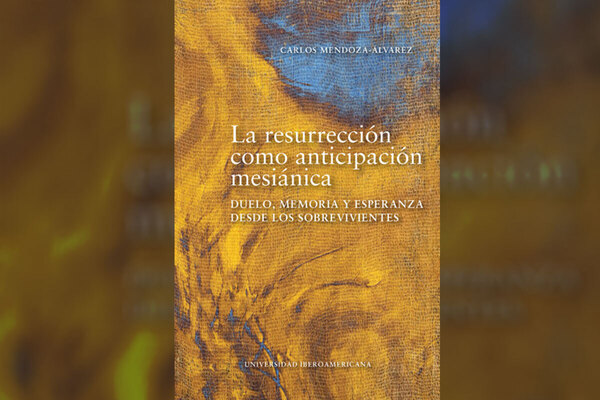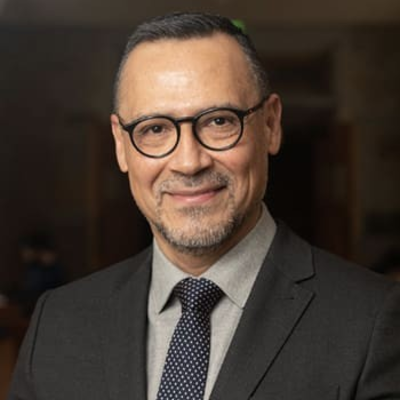
Carlos Mendoza-Álvarez is professor of theology at Boston College and Friar of the Order of Preachers. His books include Deus ineffabilis: Una teología posmoderna del fin de los tiempos (2015) and La resurrección como anticipación mesiánica: Duelo, memoria y esperanza desde los sobrevivientes (2020). He is a member of the Board of Directors of Concilium International Journal of Theology.
Mendoza-Álvarez is the second speaker in the “Decolonizing Scholarship” lunchtime lecture series hosted by the Nanovic Institute for European Studies. This series runs through the 2023 spring and fall semesters and features scholars from various academic disciplines at the top of their fields. Mendoza-Álvarez’s lecture, titled "Bodies, Territories and Knowledges in Resistance" will take place on Friday, February 24, 2023 at 12:30 p.m. in 1050 Jenkins Nanovic Halls.
In advance of his visit to Notre Dame, the EITW editors asked Mendoza-Álvarez to share his thoughts on the importance of decolonizing scholarship and some of ways in which scholars can decolonize in their thinking, communication, and teaching.

Europe in the World: Why do you think it is important to decolonize scholarship?
Carlos Mendoza-Álvarez: I think that decolonizing scholarship is indispensable for the university in times of global violence because the function of critical thinking is to contribute to the gestation of a more just, dignified, equitable, and peaceful society that allows individuals and peoples to flourish in their own diversity. Otherwise, the generation of knowledge becomes an instrument at the service of hegemonic minorities that produce systemic violence.
EITW: What methodologies do you employ to do this work? (e.g., archives or sources used, interdisciplinary approaches, etc.)
CMÁ: The decolonial methodology includes a complex network of approaches to listen to the voice, narratives and knowledge of people and collectives made invisible by systemic violence (patriarchy, colonialism, capitalism, and sacrificial religion). The interconnection of qualitative interviews, narrative practices, oral history archives and a map of different knowledges (saberes), creates a symbolic intelligence of resistances that contributes to think and transform the world from the reverse side of the hegemonic history.
EITW: When you are addressing different audiences (e.g., students in a classroom, the public, other scholars in your field), what do you have to bear in mind? How do you adapt your approach?
CMÁ: To begin with, in decolonial thought the audiences are not first those coming from the academic world, but from social movements. It is those collectives that resist violence who have experience, knowledge, and analysis of the situations they live. In the classroom, it is important to diversify, therefore, the sources consulted, not only bibliographical, but also oral history, aesthetic narratives, and performativity in the public space to analyze the problems faced, their modes of resolution, and learning about new ways of living in common. La resurrección como anticipación mesiánica (2020)
EITW: How can we incorporate decolonizing materials into our teaching? Are there any strategies you recommend?
CMÁ: To initiate this decolonial methodology, it is first necessary to promote linguistic equity. Particularly at the university level in the United States, monolingualism is a tremendous constraint. Another factor is the recognition of diversity of sources, where it is necessary to create more diverse bibliographic repositories, as well as databases of oral history, visual memory and other expressions of alternative epistemologies.
EITW: Can you provide a short list (4-5) of writers or texts that inspired you to pursue this work?
CMÁ:
- Joseph Drexler-Dreis, Decolonial Theology in the North Atlantic World (Brill, 2019).
- Gustavo Esteva, Salvatore Babones, and Philipp Babcicky, The Future of Development: A
Radical Manifesto (Bristol University Press, 2013). - Ramón Grosfoguel, Nelson Maldonado-Torres, and José David Saldívar (eds.). Latino/as in
the World-system: Decolonization Struggles in the 21st Century U.S. Empire (Routledge,
2006). - Xóchitl Leyva (coord.) Practicas otras de conocimiento(s): Entre crisis, entre guerras, 3
tomos (Cooperativa Editorial Retos, 2015). - Nelson Maldonado-Torres, Against War: Views from the Underside of Modernity (Duke
University Press, 2008). - Sylvia Marcos Sylvia, “Mesoamerican Women’s Indigenous Spirituality: Decolonizing
Religious Beliefs,” Journal of Feminist Studies in Religion, Vol. 25, No. 2 (Fall 2009),
pp. 25-45.
Originally published by at eitw.nd.edu on February 20, 2023.